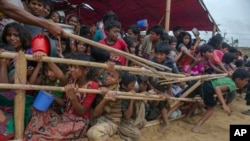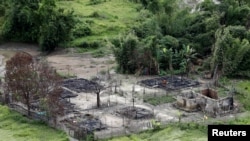International watchdog Human Rights Watch says it has discovered new destruction of Rohingya villages during October and November in northern Myanmar.
The group identified 40 new villages with building destruction, increasing their previous estimate to a total of 354 Rohingya villages that have been partially or completely destroyed since August 25, 2017. More than half a million Rohingya have fled to neighboring Bangladesh to escape violence since that date.
The group also confirmed Monday "dozens" of buildings were burned in the same week that Myanmar, also known as Burma, signed an agreement with neighboring Bangladesh to begin returning refugees within two months.
“The Burmese army’s destruction of Rohingya villages within days of signing a refugee repatriation agreement with Bangladesh shows that commitments to safe returns were just a public relations stunt,” said Brad Adams, Asia director at Human Rights Watch.
“The satellite imagery shows what the Burmese army denies, that Rohingya villages continue to be destroyed. Burmese government pledges to ensure the safety of returning Rohingya cannot be taken seriously.”
More than 600,000 Rohingya Muslims have left Myanmar’s Rakhine State since August 25, after insurgents attacked security forces and prompted a brutal military crackdown that has been described as ethnic cleansing.
Myanmar’s government has repeatedly rejected claims that atrocities, including rape and extrajudicial killings, are occurring in northern Rakhine, the epicenter of the violence the United Nations has called “textbook ethnic cleansing.”
Myanmar does not recognize the Rohingya and denies them citizenship, referring to them as “Bengali” to imply origins in Bangladesh.
Though Myanmar's de facto leader and nobel laureate Aung San Suu Kyi has been criticized for sidestepping allegations of abuses, many Western governments have been reluctant to ostracize her during a fragile transition to democracy.













